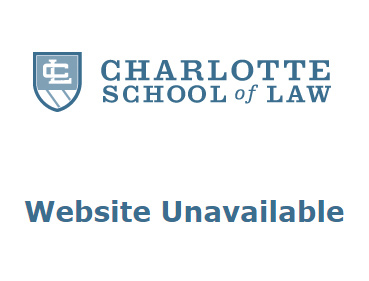After students wait a day for answers, Charlotte Law says it took down website to comply with law

From the Charlotte School of Law website.
Charlotte School of Law intends to comply with North Carolina law, and its leaders say that is why its website went dark Monday following news that its proposed teach-out plan was rejected and it missed the deadline for state licensure.
The assertion came in a Tuesday email to students from Chidi Ogene, the law school’s president, and Paul Meggett, its interim dean, WFAE reports.
According to the email, the law school is actively seeking review and guidance from the University of North Carolina “Licensure Unit,” to ensure that the school is not performing “post-secondary degree activity.”
“Further, to ensure that CSL does not inadvertently run afoul of North Carolina law, we have taken down the school’s website to avoid any perception that we may be engaged in unauthorized conduct,” the email reads. “In light of these new circumstances, Wednesday’s Town Hall meeting is cancelled. Your best interests remain our primary concern and we will send any necessary updates as they’re available.”
The law school was placed on probation by the ABA in October, for not meeting various standards dealing with admissions and program objectives. In December, student loan money was pulled by the U.S. Department of Education, which found that the law school was not honest with current and future students about it’s ABA issues.
The council of the ABA’s Section of Legal Education and Admissions to the Bar notified the law school Monday that its teach-out plan was not approved. The letter also stated that the section’s accreditation committee in June rejected Charlotte School of Law’s reliable plan, which detailed how it would come into compliance with accreditation standards. Goals included restructuring curriculum and bar preparation programs and projected increases in LSAT scores for entering classes.
R. Lee Robertson Jr., president of the Charlotte School of Law alumni club, emailed members about the developments on Tuesday.
“Discussions between school leadership and the Alumni Association President were not intended for general distribution to the Alumni Association or any other outlet and were not representative of all information,” Ogene’s email says. Ogene’s email, like Robertson’s email, states that the UNC board of governors declined the school’s request to extend its licensing deadline.
The school remains on probation, Barry Currier, the ABA’s managing director of accreditation and legal education, wrote in statement (PDF) dated Friday and released Tuesday.
“The next step is for Charlotte School of Law to submit a revised plan that reflects its current status with the U.S. Department of Education and its state licensing agency that either is a plan for the orderly closure of the law school or one that forms part of a revised reliable plan to continue operating as a degree-granting institution in compliance with the ABA Standards, as appropriate,” the statement reads. “We will continue to monitor the matter. However, until additional information is received, there is nothing further to say regarding the accreditation of the Charlotte School of Law.”
Since December, and as recently as July 31, the law school has suggested multiple times that it’s federal loan money will be reinstated. On Tuesday Liz Hill, press secretary at the U.S. Department of Education, told the ABA Journal that the agency had not received a closure notification from Charlotte School of Law.
“That being said, the department is committed to ensuring that students of CSL, who are the ones most impacted by any decision regarding CSL’s status, are protected and treated fairly,” her statement reads.
Josh Stein, North Carolina’s attorney general, claims that under state law, Charlotte School of Law must close. In April, the agency opened a civil fraud investigation against the law school.
Stein’s office has notified the department of its position.
“Many of the students recently enrolled at Charlotte School of Law now have rights under federal regulations that will help them with their student loans,” Stein said in a statement. “Under the closed school discharge rule, students who were recently enrolled are entitled to complete loan forgiveness.”



